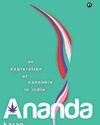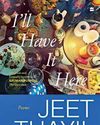
I GREW UP in and around Sharp’s department store on Front Street in Campbellford, Ontario. It was run by my maternal grandmother, Mrs Sharp, and when I was growing up in the 1960s and ’70s, I was one of various family members who worked there occasionally.
I learnt the difference between nylon and metal zippers, which fabrics should be cut and which needed to be torn, and how to sort patterns and match colours of embroidery floss. I also learned something much more important: the place of a family business in the community.
Mrs Sharp knew her customers. She heard the rumours of domestic violence; of women who had little money to buy essentials; of families struggling to care for sons who had returned from war suffering with what was then called ‘shell shock’; of unplanned pregnancies and the need for the discreet purchase of certain sewing patterns to help prevent gossip.
End-of-the-bolt fabrics and discarded patterns made their way into the hands of mothers whose children needed clothes for the start of the school year. Widows without cash for undergarments bought them on credit, sometimes in tears: “I hate to ask. It has been so hard since Charlie died. You know I am good for it. Thank you. God bless you.”
When my partner and I were still in university, we became parents. Our budget was tight—at the time, inflation was more than 11 per cent and interest rates were above 18 per cent. Still, we saved so we could afford the occasional splurge.
Denne historien er fra August 2024-utgaven av Reader's Digest India.
Start din 7-dagers gratis prøveperiode på Magzter GOLD for å få tilgang til tusenvis av utvalgte premiumhistorier og 9000+ magasiner og aviser.
Allerede abonnent ? Logg på
Denne historien er fra August 2024-utgaven av Reader's Digest India.
Start din 7-dagers gratis prøveperiode på Magzter GOLD for å få tilgang til tusenvis av utvalgte premiumhistorier og 9000+ magasiner og aviser.
Allerede abonnent? Logg på

ME & MY SHELF
Siddharth Kapila is a lawyer turned writer whose writing has focussed on issues surrounding Hinduism. His debut book, Tripping Down the Ganga: A Son's Exploration of Faith (Speaking Tiger) traces his seven-year-long journey along India's holiest river and his explorations into the nature of faith among believers and skeptics alike.

EMBEDDED FROM NPR
For all its flaws and shortcomings, some of which have come under the spotlight in recent years, NPR makes some of the best hardcore journalistic podcasts ever.

ANURAG MINUS VERMA PODCAST
Interview podcasts live and die not just on the strengths of the interviewer but also the range of participating guests.

WE'RE NOT KIDDING WITH MEHDI & FRIENDS
Since his exit from MSNBC, star anchor and journalist Mehdi Hasan has gone on to found Zeteo, an all-new media startup focussing on both news and analysis.

Ananda: An Exploration of Cannabis in India by Karan Madhok (Aleph)
Karan Madhok's Ananda is a lively, three-dimensional exploration of India's past and present relationship with cannabis.

I'll Have it Here: Poems by Jeet Thayil, (Fourth Estate)
For over three decades now, Jeet Thayil has been one of India's pre-eminent Englishlanguage poets.

Orbital by Samantha Harvey (Penguin Random House India)
Samantha Harvey became the latest winner of the Booker Prize last month for Orbital, a short, sharp shock of a novel about a group of astronauts aboard the International Space Station for a long-term mission.

She Defied All the Odds
When doctors told the McCoombes that spina bifida would severely limit their daughter's life, they refused to listen. So did the little girl

DO YOU DARE?
Two Danish businesswomen want us to start eating insects. It's good for the environment, but can consumers get over the yuck factor?

Searching for Santa Claus
Santa lives at the North Pole, right? Don't say that to the people of Rovaniemi in northern Finland